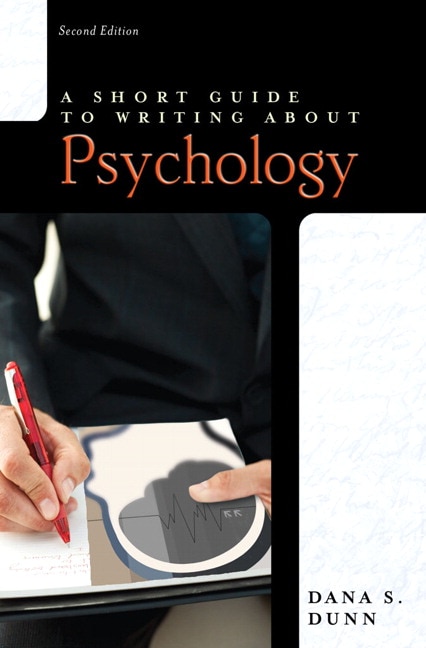
30.00$ - DOWNLOAD
- Digital File Direct & Fast Download ( Bank Exam ZIP & PDF) only for 30.00$
- All chapters are included in the test Bank Exam
- Free samples included once needed (ZIP & PDF)
- Multiple payment options (Paypal , Credit Card) - NO account Required
- Dedicated support / instant chat – Email - Whatsapp
- Digital file of Short Guide to Writing about Psychology, 2nd Edition for sale
Category : Higher Education
***THIS IS NOT THE ACTUAL BOOK. YOU ARE BUYING the Test Bank in e-version of the following book***
PREFACE xiii 1–WRITING ABOUT PSYCHOLOGY 1 Writing as a Process 1 Why Write, Anyway? 2 Forms of Writing in Psychology 5 Student Papers 6 Introducing APA Style 7 Planning Your Writing: Timing Is Everything 8 Answering a Test Question 9 Writing a Paper 11 A Basic Timeline 11 Writing Habits 11 Exercises 12 2–SEARCHING THE PSYCHOLOGICAL LITERATURE 13 Selecting a Research Topic 13 Maintaining a Research Notebook 15 Narrowing Your Focus 16 Process Overview: Searching the Psychological Literature 19 Doing Library Research 20 A Brief Guide to Reference Works in Psychology 20 Using Online Catalogs 24 Psychology Online: Using Databases 25 Searching the Internet 28 Search and Metasearch 29 Other Internet Resources 31 Using the Internet: Caveat Emptor 32 Keeping Track of References 34 Logging References in a Working Bibliography 34 Exercises 36 3–READING THE PSYCHOLOGICAL LITERATURE 37 The Scientific Pecking Order: Why Journals Are First 38 How to Read and Evaluate the Literature 39 How to Read a Journal Article 40 Skimming: Doing a Quick Prereading 42 Taking Notes on What You Read 45 Using Notecards 45 Using a Research Notebook 46 Recognizing and Preventing Plagiarism 46 A Plagiarism-Awareness Exercise 48 One More Word of Advice 51 Exercises 52 4–GETTING STARTED WRITING 53 Getting Started: Prewriting Activities 55 Freewriting 56 Outlining 58 Writing a First Draft 63 Trick Drafts: Starting with the Roughest Draft 64 Writing a Hypothesis and Composing Paragraphs 65 A Recommended Order for Drafting APA-Style Papers 67 Writing Subsequent Drafts 69 Three Issues to Consider 69 Suggestions for Further Improvement 71 How Many Drafts? 72 Revising: Top to Bottom Every Time 73 Revisiting a Draft 74 Seeking Feedback 77 Professor, Peer, or Writing Center? 77 How to (Graciously) Receive Feedback 78 How to (Graciously) Give Feedback 79 Exercises 80 5–WRITING APA-STYLE PAPERS: CONTENT AND GUIDANCE 81 Benefits of APA Style 81 Bem’s Hourglass Model for Empirical Writings 82 Writing the Empirical, or Research, Paper in APA Style 82 Title 82 Abstract 85 Introduction 88 Method 93 Results 98 Discussion 99 References 102 Tables and Figures 102 Appendix 103 Author Note 103 A Sample Research Paper 104 Writing an Article Critique 116 Writing a Research Proposal 116 Writing a Literature Review Paper 117 Writing a Theory Paper 119 Exercises 119 6–WRITING UP RESULTS 121 Conveying Statistical Results in Words 121 Starting with a Hypothetical Research Result 121 Organizing the Results Section 125 Reflecting Further on Your Results 128 New APA Guidelines on Statistical Methods 128 Meaning Before Numbers: The MAGIC Criteria 130 Exercises 131 7–CITING REFERENCES IN APA STYLE 132 Citations and References 132 Learning the Psychological Literature by Reading References Sections 133 Basic Citation Mechanics 134 Citing References Within Text 134 Quoting and Paraphrasing 136 Citing Secondary Sources 142 Formats for APA-Style References 143 Journal Articles 144 Books 145 Edited Books 146 Chapters in Edited Books 146 Magazine or Newspaper Articles 144 Presentations at Professional Meetings or Conferences 147 Electronic (Online) Sources 147 Reviews 149 Personal Communications 149 Letters to the Editor 149 Dissertations and Master’s Theses 149 Unpublished Manuscripts or Data 150 Exercises 152 8–DISPLAYING DATA IN TABLES AND FIGURES 153 Tables 153 Constructing a Table 154 Figures 157 Constructing a Figure 159 Exercises 162 9–FORMATTING AND PROOFREADING YOUR PAPER 163 Grammar Guidelines 163 Punctuation Basics 167 Some Common Usage Errors in Student Writing 170 Checking Your Spelling 172 Checking Your Writing Voice: Be Active, Not Passive 173 Using Inclusive Language 174 Gender and Sex 176 Race and Ethnicity 178 Guidelines for Formatting in APA Style 178 Title Page 179 Page Numbering 180 Headings and Subheadings 180 Quickly Checking a Paper’s Format 181 Proofreading the Penultimate Draft: Once More with Feeling 181 Exercises 185 10–BEYOND WRITING: PRESENTING PSYCHOLOGICAL RESEARCH 186 The Call for Papers 186 Understanding Call Types and Requirements 187 Knowing Your Audience 189 The Talk 191 Outlining a Talk 192 Preparing Overheads, Slides, and Handouts 193 Computer-Aided Presentations 193 Practice, Practice, Practice 195 Giving the Talk: Be a Pro, Avoid the Cons 195 Symposia: Talks in Common 199 Student Symposia 199 Poster Presentations 200 Knowing What to Expect 201 Creating a Poster: Less Is More–and More Is a Bore 202 Return to Writing: Submitting Your Research to a Journal 205 Student Journals 206 Professional Journals 206 Submission, Peer Review, and Editorial Decision: A Process Outline 208 Patience, Patience, Patience 210 Exercises 211 APPENDIX–SOME JOURNALS IN PSYCHOLOGY 212 REFERENCES 214 CREDITS 220 INDEX 223 Table of Contents
Manual solution Short Guide to Writing about Psychology, 2nd Edition for sale , Short Guide to Writing about Psychology, 2nd Edition for sale , Short Guide to Writing about Psychology, 2nd Edition pdf for sale , Dana S. Dunn, Moravian College


0 commentaires:
Enregistrer un commentaire